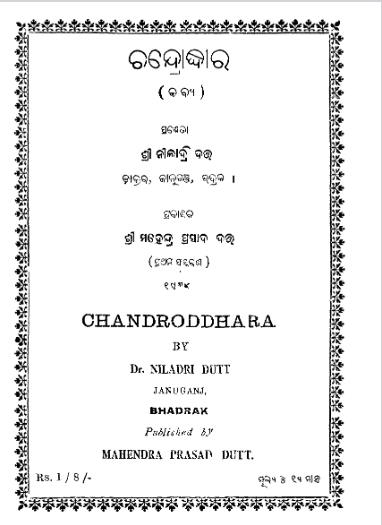In the vibrant tapestry of Odia literature, the year 1934 marked a significant contribution with the publication of Kabya Chandrodhara by the esteemed poet Niladri Datta. This collection of poetry stands out not only for its artistic merit but also for its exploration of deep philosophical themes and its evocation of cultural identity. Kabya Chandrodhara, meaning “The Moonlit Poetry,” captures the essence of human emotions, the beauty of nature, and the philosophical reflections that define the human experience.
Niladri Datta’s Kabya Chandrodhara is a testament to his profound understanding of language and the power of poetic expression. The collection is notable for its rich imagery, melodic rhythms, and a unique ability to evoke emotion through carefully crafted verses. Datta’s command over Odia allows him to create a lyrical quality that resonates with readers, drawing them into a world of beauty and contemplation.
One of the key themes in Kabya Chandrodhara is the exploration of nature. Datta’s poetry frequently celebrates the natural world, using vivid descriptions that transport readers to lush landscapes filled with flora and fauna. His verses reflect a deep connection to the environment, illustrating how nature serves as both a backdrop and a character in the poetic narrative. Through this connection, Datta invites readers to appreciate the beauty around them and to find solace and inspiration in the natural world.
In addition to the celebration of nature, Kabya Chandrodhara delves into the complexities of human emotions and relationships. The poet examines themes of love, longing, and existential inquiry, crafting verses that resonate with a wide range of experiences. His ability to articulate the nuances of emotion—with a blend of sweetness and poignancy—strikes a chord with readers, allowing them to see their own lives reflected in his work. The depth of feeling conveyed in Datta’s poetry serves to strengthen connections between the writer and the reader, making the poetry an intimate experience.
Philosophical reflections are another significant aspect of Kabya Chandrodhara. Niladri Datta often contemplates the nature of existence, the passage of time, and the quest for meaning in life. His verses encourage readers to ponder profound questions about identity, purpose, and the human condition. This philosophical undertone adds layers of complexity to the poetry, inviting readers not only to appreciate the beauty of words but also to engage with the deeper meanings embedded within them.
Datta’s work in Kabya Chandrodhara reflects the cultural milieu of Odisha during the early 20th century. This era was a time of awakening, as many writers sought to articulate a distinct Odia identity in the face of colonial influences. Through his poetry, Datta contributes to the cultural renaissance of the period, celebrating Odia heritage and promoting a sense of pride in local traditions. His language imbues the text with a sense of place, drawing on the rhythms, sounds, and imagery that characterize the region.
Books Info
| Books name | Chandrodhara |
| Author | Niladri Datta |
| No Of pages | 164 |
| Publisher | Sri Mahandra Prasad Dutt |
| Publication | 1934 |
| Printed At | Mahandra Prasad Dutt |
| Distributor | NA |

